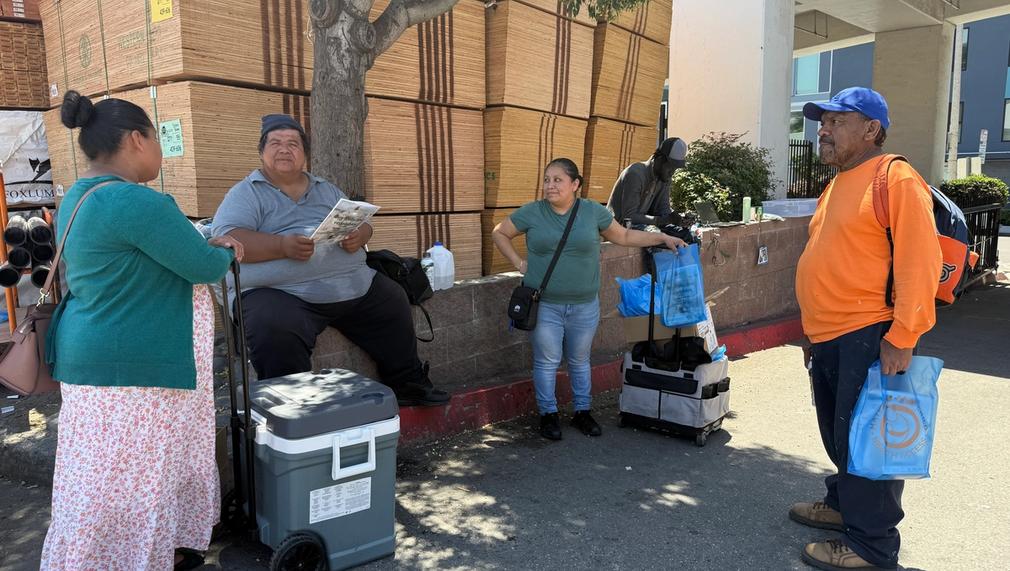Leamos! Literacy and Tech for Spanish Speakers
This grant supports expansion of basic Spanish literacy and tech issues necessary for civic participation – QR codes, email, uploading documents - to up to 50 adult immigrants, and a series of community classes on common tech topics for 100+ people. Trained Maternal and Child Health Access (MCHA) staff will assist with the self-paced online courses. MCHA will provide some childcare onside students, and participant and family members will benefit from health and food resource assistance.

What is the primary issue area that your application will impact?
Health care access
In which areas of Los Angeles will you be directly working?
Central LA County of Los Angeles (select only if your project has a countywide benefit)
In what stage of innovation is this project, program, or initiative?
Expand existing project, program, or initiative (expanding and continuing ongoing, successful work)
What is your understanding of the issue that you are seeking to address?
One in six adults in the US have less than basic literacy skills, but the problem is worse in LA County, where the figure is approximately one in three adults (National Center for Education Statistics). They may not be able to read news articles, job applications, medical prescriptions, and voting forms. Adults who cannot read may be denied jobs and a cycle of illiteracy created if adults are unable to read to or help their own children. The data for Spanish-language learners in 2010-12 in California, show more than 565,000 Spanish-speaking adults could not read or write in any language (American Community Survey). According to 2022 Census Estimates, 38% of LA residents over five years old speak Spanish in the home. Community members desperately want to learn to read and write in their own language. We are also aware of the tech issues when accessing “accounts” of any kind. Medi-Cal applications show 30% difference in success when one gets help from a community organization.
Describe the project, program, or initiative this grant will support to address the issue.
MCHA will expand and better support our Adult Spanish Literacy program and include technology assistance. We taught classroom literacy 25 years ago, before the rise of computer-based learning. Now, self-paced literacy courses are available online. This year we re-energized literacy work with web-based Leamos, designed to help non-literate Spanish-speaking adults learn the sounds of the alphabet, read and write simple words, and learn writing skills in Spanish. The course is for adults who never went to school or who attended for only 1 – 2 years, which describes many immigrants here fleeing poverty and violence in Mexico and Central America.
The average course completion is 100 – 150 hours or 3 – 5 months, depending on the hours a student can commit. Thus, there is not a lot of turnover, as the program recognizes that most students are starting at a very basic level. Students can complete part of the course at home if they have access to the internet, but many don’t, or live in overcrowded conditions and/or need MCHA’s support to learn how to use and manage a computer or smart phone.
We will expand the number of students, support our trained staff, and provide at least limited childcare to allow women with children under five years old to participate. MCHA will also offer a series of very basic tech classes using community trainers and examples, to expand our reach by 100+.MCHA will offer assistance with health coverage and food benefits applications and issues.
Describe how Los Angeles County will be different if your work is successful.
MCHA will add a unique service to the web of interconnected support extended to low or non-literate adult Spanish speakers. Since Centro Latino closed in Pico Union, little literacy assistance is available for adult Spanish speakers. Only two LA County libraries offer Leamos, Huntington Park and East Los Angeles, that would be very far for those in the downtown/Pico Union areas.
The direct effect will be at least 250 additional lives improved: 50 who learn basic reading skills in Spanish, and two more people in each of their families affected and/or who gain better health and nutrition through MCHA’s assistance, and 100 in MCHA’s basic tech topics classes in Spanish. The ability to read medicine labels, job applications and forms, children’s books, and the self-confidence literacy provides does improve lives. This program will contribute to increased rates of Spanish literacy and technological literacy necessary for daily life, and help cement this program as an MCHA service.
Approximately how many people will be impacted by this project, program, or initiative?
Direct Impact: 150
Indirect Impact: 150